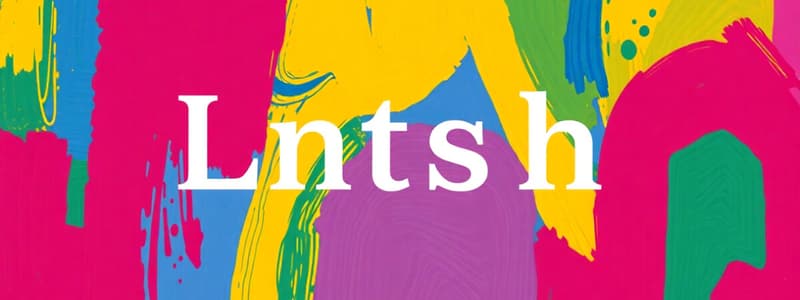Podcast
Questions and Answers
Which of the following is the British English term for 'apartment'?
Which of the following is the British English term for 'apartment'?
- Flat (correct)
- Studio
- House
- Condo
What is 'queue' called in American English?
What is 'queue' called in American English?
- Line (correct)
- Huddle
- Crowd
- Circle
Received Pronunciation (RP) is the only accent spoken in Britain.
Received Pronunciation (RP) is the only accent spoken in Britain.
False (B)
In which of the following scenarios is the use of 'shall' most appropriate?
In which of the following scenarios is the use of 'shall' most appropriate?
Which cultural aspect is highly valued in British conversations, often leading to misunderstandings for non-natives?
Which cultural aspect is highly valued in British conversations, often leading to misunderstandings for non-natives?
What does 'taking the piss' mean in British slang?
What does 'taking the piss' mean in British slang?
Why can regional accents like Scouse and Geordie be difficult for non-natives?
Why can regional accents like Scouse and Geordie be difficult for non-natives?
In British English, stating your point of view in an overly direct manner can be considered...
In British English, stating your point of view in an overly direct manner can be considered...
What should you typically do before using someone's first name in a formal British setting?
What should you typically do before using someone's first name in a formal British setting?
Topics about politics are always inappropriate in British conversation.
Topics about politics are always inappropriate in British conversation.
In British English, the word 'crisps' refers to what Americans call ______.
In British English, the word 'crisps' refers to what Americans call ______.
If someone says they are 'knackered', it means they are very ______.
If someone says they are 'knackered', it means they are very ______.
Which of the following is a common conversation starter in British culture?
Which of the following is a common conversation starter in British culture?
What is the British English equivalent of the American English phrase 'How are you?' as a greeting?
What is the British English equivalent of the American English phrase 'How are you?' as a greeting?
Which phrase best describes the expected behavior regarding queuing in Britain?
Which phrase best describes the expected behavior regarding queuing in Britain?
Match the British English word to the American English equivalent:
Match the British English word to the American English equivalent:
What does 'dodgy' typically mean in British slang?
What does 'dodgy' typically mean in British slang?
If someone responds to an offer with 'sorted', it means...
If someone responds to an offer with 'sorted', it means...
Exposure to which of the following is most beneficial for improving comprehension of British English dialects?
Exposure to which of the following is most beneficial for improving comprehension of British English dialects?
Formal register in British English includes usage of slang and contractions.
Formal register in British English includes usage of slang and contractions.
What is expected when someone shows you hospitality in Britain?
What is expected when someone shows you hospitality in Britain?
In British culture, excessive volume in public spaces is generally seen as...
In British culture, excessive volume in public spaces is generally seen as...
How is the word 'sorry' used differently in British English compared to American English?
How is the word 'sorry' used differently in British English compared to American English?
What characterises humour in British conversations?
What characterises humour in British conversations?
What should you typically include at the beginning of a telephone conversation in Britain?
What should you typically include at the beginning of a telephone conversation in Britain?
Which of the following is a typical characteristic of written communication in British English?
Which of the following is a typical characteristic of written communication in British English?
What is one common spelling difference between American and British English?
What is one common spelling difference between American and British English?
British English rarely uses conversational fillers.
British English rarely uses conversational fillers.
What does the British slang term 'gutted' mean?
What does the British slang term 'gutted' mean?
Which of the following activities is the best way to immerse oneself in British English?
Which of the following activities is the best way to immerse oneself in British English?
Flashcards
British English Vocabulary
British English Vocabulary
British English uses different words for common items, such as 'flat' for apartment and 'lift' for elevator.
Received Pronunciation (RP)
Received Pronunciation (RP)
Received Pronunciation, or RP, is considered the standard accent in British English, but regional accents vary widely.
Collective Nouns
Collective Nouns
In British English, collective nouns can be treated as singular or plural, depending on the context.
Politeness in British Culture
Politeness in British Culture
Signup and view all the flashcards
Meaning of 'Cheers'
Meaning of 'Cheers'
Signup and view all the flashcards
Regional Dialects
Regional Dialects
Signup and view all the flashcards
Formal vs. Informal Language
Formal vs. Informal Language
Signup and view all the flashcards
British Etiquette
British Etiquette
Signup and view all the flashcards
Versatile Use of 'Sorry'
Versatile Use of 'Sorry'
Signup and view all the flashcards
British Humor
British Humor
Signup and view all the flashcards
Addressing People
Addressing People
Signup and view all the flashcards
Conversational Fillers
Conversational Fillers
Signup and view all the flashcards
"You alright?" or "Alright?"
"You alright?" or "Alright?"
Signup and view all the flashcards
"Fancy"
"Fancy"
Signup and view all the flashcards
"Taking the piss"
"Taking the piss"
Signup and view all the flashcards
"Dodgy"
"Dodgy"
Signup and view all the flashcards
"Knackered"
"Knackered"
Signup and view all the flashcards
"Rubbish"
"Rubbish"
Signup and view all the flashcards
"Brilliant"
"Brilliant"
Signup and view all the flashcards
"Gutted"
"Gutted"
Signup and view all the flashcards
"Sorted"
"Sorted"
Signup and view all the flashcards
Study Notes
- British English conversation encompasses various aspects, including vocabulary, pronunciation, grammar, and cultural nuances.
Vocabulary
- British English uses different words for common items compared to American English.
- Examples include "flat" (apartment), "lift" (elevator), "queue" (line), "crisps" (chips), "chips" (fries), "biscuit" (cookie), and "jumper" (sweater).
- Slang varies regionally; understanding regional slang can be challenging but adds colour to conversations.
- Politeness is key, with phrases like "please," "thank you," and "sorry" used frequently.
Pronunciation
- Received Pronunciation (RP), also known as BBC English or Queen's English, is often considered the standard accent, though many regional accents exist.
- Common pronunciation differences include the "r" sound after vowels (often dropped in RP) and vowel sounds themselves.
- The "t" sound can be glottalized (stopped) in certain contexts, especially in Cockney and other regional accents.
- Intonation patterns may differ; British English can sound more modulated than American English.
Grammar
- Collective nouns (e.g., team, government) can be treated as singular or plural depending on the context.
- Use of "shall" instead of "will" in formal contexts or for offers and suggestions ("Shall we go?").
- Different prepositions are used in some cases (e.g., "at university" instead of "in university").
- The use of the present perfect tense is more prevalent compared to American English.
Cultural Nuances
- Politeness and understatement are valued.
- Sarcasm and irony are common and can be easily misunderstood by non-native speakers.
- A degree of formality is often maintained, especially in initial interactions.
- Queuing is taken seriously; jumping the queue is frowned upon.
- Humor plays a significant role; self-deprecation is common.
- Discussions about the weather are typical conversation starters.
- A strong class system influences social interactions and language use to a degree.
- Punctuality is generally expected, particularly in formal settings.
- Directness is softened to avoid causing offense.
- Discussions of salary, personal matters are considered impolite, particularly with those not well-acquainted.
Common Phrases and Expressions
- "Cheers" can mean "thank you" or "goodbye."
- "You alright?" or "Alright?" as a greeting meaning "How are you?"
- "Fancy" meaning "to like" or "to want."
- "Taking the piss" meaning "to make fun of."
- "Dodgy" meaning "suspicious" or "unreliable."
- "Knackered" meaning "tired" or "exhausted."
- "Rubbish" meaning "nonsense" or "of poor quality."
- "Brilliant" meaning "excellent" or "fantastic."
- "Gutted" meaning "very disappointed."
- "Sorted" meaning "arranged" or "dealt with."
Regional Variations
- Cockney in London uses rhyming slang and distinct pronunciation.
- Scouse in Liverpool, Geordie in Newcastle, and West Country dialects can be challenging for non-natives to understand.
- Accents and dialects reflect local history and culture.
- Exposure to different regional accents is beneficial for comprehension.
Formal vs. Informal Conversation
- Formal conversations require more precise language and adherence to grammatical rules.
- Informal conversations allow for more slang, colloquialisms, and relaxed grammar.
- Adjust language based on the context and relationship with the speaker.
Etiquette
- Avoid talking loudly in public spaces.
- Offer to buy a round of drinks in a pub.
- Be mindful of personal space.
- Show appreciation for hospitality.
Use of "Sorry"
- "Sorry" is used not only for apologies but also to express mild disagreement or to get someone's attention.
- It can also be used preemptively to avoid causing inconvenience.
Levels of Formality
- Very formal language uses elaborate vocabulary and avoids contractions.
- Semi-formal language balances politeness with a more relaxed tone.
- Informal language uses colloquialisms, slang, and contractions.
Topics to Avoid
- Asking about politics unless you know the person well.
- Inquiring about income or personal finances.
- Making overly personal comments about appearance.
Conversational Fillers
- Common fillers include "you know," "sort of," "kind of," and "innit" (especially in certain dialects).
- Overuse can be distracting, so use them sparingly.
Addressing People
- Use titles (Mr., Mrs., Dr., etc.) until invited to use first names.
- Younger people are more likely to use first names from the outset.
Humor
- British humor often involves understatement, irony, and self-deprecation.
- Sarcasm can be used subtly, and the tone of voice is essential for conveying the intended meaning.
- Overly aggressive or insensitive humor is generally avoided.
Telephone Conversations
- Start by identifying yourself and your purpose.
- Speak clearly and politely.
- Use formal language unless speaking to someone you know well.
Body Language
- Maintain eye contact, but avoid staring.
- Use subtle gestures.
- Be aware of personal space.
Written Communication
- Emails and letters follow similar rules of formality as spoken conversations.
- Proofread carefully for grammar and spelling errors.
- Use appropriate greetings and closings.
Differences in Usage
- American English favours simplified spellings (e.g., "color" vs. "colour").
- There are differences in the usage of auxiliary verbs and modal verbs.
- Certain phrases have different connotations in British and American English.
Practice Tips
- Listen to British radio and TV to become familiar with accents and expressions.
- Engage in conversations with native British English speakers.
- Read British newspapers and books.
- Watch British films and TV shows.
- Consider visiting the UK to immerse yourself in the language and culture.
Studying That Suits You
Use AI to generate personalized quizzes and flashcards to suit your learning preferences.




